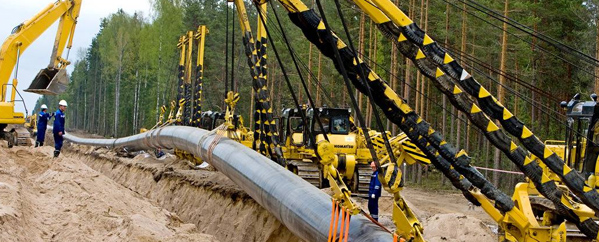Professional Training in English Language (Hydrocarbons Transportation and Storage).
Part 2: Pipeline Construction. Pipeline Integrity Assesment. Liquefied Natural Gas. Offshore Pipeline
Course Overview
When student successfully complete this course, he/she will be prepared to:
- list the various technologies and equipment;
- know the basic principles of pipeline construction operations; marine pipeline fitures; liquefied natural gas industry specifics;
- describe the processes, graphs and schemes;
- explain the structure of basic principles of technological process;
- analyze activities in typical pipeline construction siquence;
- discuss professional topics in group;
- demonstrate basic communication skills by working in pairs and small group.
Course will rely on some of methods to assess student learning, including:
- Text and a talk about all topics of the course:
Unit 1.1. Staging of pipeline components and construction equipment. Clearing and grading. Stringing pipe joints along the right-of-way (ROW)
Unit 1.2. Ditching. Pipe bedding material. Welding. Pipe bending.
Unit 1.3. Pipe coating. Lowering the pipeline into the ditch. Backfilling the ditch. Hydrostatic testing. Final grading and reclamation.
Unit 1.4. Special condition
Unit 2. Pipeline integrity assesment
Unit 3. Liquefied natural gas
Unit 4. Offshore pipeline
- Crosswords
-
Some tests and assignments, which may contain:
- Answering questions
- Completion tasks
- Creation tasks
- Essay questions, which ask you to write a response to a specific question or video
Be an intermediate learner of English.
Prepare and give oral presentation using visual aids.
Have basic concepts in professional area.
Grading Policy
The grading guidelines are as follows: attendance (7%), assignments (93%), in particular, preparation of topics (35%).
Outcomes
Skills to be developed within this course:
- Subject specific skills:
Know professional terminology (in English).
Know main principles of pipelines and storages construction and operation.
Know equipment. Describe the technical process.
- Research and intellectual skills:
Assimilate material independently.
Critical analyse technical process and conditions.
- Generic skills:
Work effectively to deadlines.
Present and debate ideas.
Prepare and give oral presentation using visual aids.
Undertake independent work.
Speaking, writining, leastening regarding typical pipeline construction sequence, pipeline integrity assesment, liquefied natural gas, offshore pipeline.
Educational program
21.03.01 Oil and Gas Engineering, bachelor degree programme «Operation and maintenance of transport and storage facilities for oil, gas and refined products» (6th semester of 2022-2023 academic year).
The primary learning activities for this course
Unit 1.1. Staging of pipeline components and construction equipment. Clearing and grading. Stringing pipe joints along the right-of-way (ROW)
Unit 1.2. Ditching. Pipe bedding material. Welding. Pipe bending.
Unit 1.3. Pipe coating. Lowering the pipeline into the ditch. Backfilling the ditch. Hydrostatic testing. Final grading and reclamation.
Course Duration, Number of Credits, Format of Delivery
Course Duration – 16 lessons in length (18 weeks)
Number of contact hours: 72 (in semester): practical sessions (seminars) - 32 hours
Number of credits – 2 credits
Pass/Fail test
Course Developer
Shadrina Anastasiia Victorovna,
Dr. Science in Exploration technology, Professor at Oil and Gas Engineering Department,
leader of master's degree programme «Reliability and safety of hydrocarbon transportation and storage facilities»,
https://portal.tpu.ru/SHARED/k/KR_NAS_SH
Copyright © 2023.
Томский политехнический университет. Все права защищены
Tomsk Polytechnic University, All rights reserved.

- Учитель: Шадрина Анастасия Викторовна